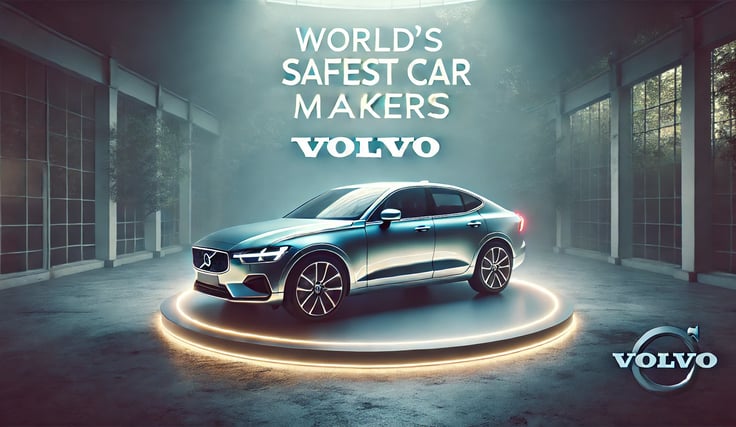Are Volvo Cars Really the Safest? My Thoughts as a Student and Car Enthusiast
A few months ago, I found myself gripping the steering wheel tightly as rain poured down relentlessly. My tiny hatchback struggled for grip as I cautiously drove home after a family outing. I remember thinking, What if this car wasn’t safe enough? Would I have the confidence to keep going? That night sparked a curiosity in me: What really makes a car “safe”? Is it the technology, the design, or something else? One name kept popping up during my research—Volvo. With its reputation for safety, I couldn’t help but wonder: Is Volvo truly the safest car brand out there, or is it just brilliant marketing?
Laksh Rathore
12/5/20243 min read


Introduction:
A few months ago, I found myself gripping the steering wheel tightly as rain poured down relentlessly. My tiny hatchback struggled for grip as I cautiously drove home after a family outing. I remember thinking, What if this car wasn’t safe enough? Would I have the confidence to keep going?
That night sparked a curiosity in me: What really makes a car “safe”? Is it the technology, the design, or something else? One name kept popping up during my research—Volvo. With its reputation for safety, I couldn’t help but wonder: Is Volvo truly the safest car brand out there, or is it just brilliant marketing?
Here’s what I’ve learned through my dive into the world of automotive safety, combined with some insights from friends, family, and my own experiences.
1: Volvo’s Legacy of Safety Innovation
Growing up, I heard my dad say, “If you want the safest car, go for a Volvo.” I always assumed it was an exaggeration until I looked into their history. Did you know Volvo invented the modern three-point seatbelt in 1959? They didn’t patent it so other manufacturers could use it, which likely saved millions of lives. Talk about putting safety above profits!
In fact, studies show that seatbelts have reduced fatal injuries by about 50% in crashes. That one innovation alone solidified Volvo’s reputation for safety. But they didn’t stop there. Volvo pioneered side-impact protection, whiplash protection systems, and pedestrian detection technology.
According to the National Highway Traffic Safety Administration (NHTSA), Volvo consistently receives top marks in crash tests. The Insurance Institute for Highway Safety (IIHS) has also named many Volvos as Top Safety Picks. So, the brand’s commitment to safety isn’t just hype—it’s backed by decades of innovation and results.
In my opinion, Volvo’s obsession with safety stems from their Scandinavian roots. Sweden, where Volvo originated, has a vision called Vision Zero, aiming for zero road deaths. It makes sense that a car brand born there would strive for the same
2: Personal Experiences and Conversations
When I asked my friends and family about their experiences with Volvos, the stories were fascinating. My cousin Neha, who drives a Volvo XC40, swears by it. She told me about an incident where her car’s automatic emergency braking kicked in and prevented a collision. “I didn’t even see the car coming,” she said, “but my Volvo did.”
I had to test this for myself. On a test drive of the Volvo XC90, I was amazed by its intuitive safety features. The lane-keeping assist gently nudged me back when I drifted, and the blind-spot monitor warned me of cars I didn’t even notice.
However, safety features aren’t foolproof. A quick Google search reveals instances where even Volvos failed to prevent accidents. While no car can guarantee 100% safety, Volvo seems to minimize risks better than most.
3: Safety vs. Cost—Is It Worth It?
Let’s be real—Volvos aren’t cheap. As a university student, I can only dream of owning one right now. But is the safety premium worth it?
Here’s a thought experiment: Imagine two cars—one costs ₹30 lakh and has top-tier safety features, while the other is ₹20 lakh but lacks advanced tech. Which would you choose? Many people would opt for the cheaper car, prioritizing affordability over safety.
But consider this: The World Health Organization (WHO) reports that road traffic injuries are the leading cause of death for people aged 5–29. Investing in safety could literally save your life.
In my opinion, while Volvo’s upfront costs are high, the peace of mind they offer is priceless. For families, especially those with young children, this becomes even more important
Conclusion: What I’ve Learned About Car Safety
Exploring Volvo’s safety story has taught me that safety isn’t just about airbags and crash tests—it’s about innovation, culture, and responsibility. While no car can guarantee your survival in every situation, some brands, like Volvo, go above and beyond to minimize risks.
So, is Volvo the safest car brand? In my opinion, they probably are, but “safe” is subjective. What’s safe for one person might not feel safe for another. Ultimately, it’s about finding a car that fits your needs and makes you feel secure.
If you’re considering buying a car, I’d say: Don’t just look at the price tag or flashy features. Think about what truly matters. After all, as I learned on that rainy night, safety isn’t just a luxury—it’s a necessity.
What do you think? Would you invest in a Volvo for its safety, or do you believe other brands offer comparable security? Let me know your thoughts—after all, I’m still learning too!
